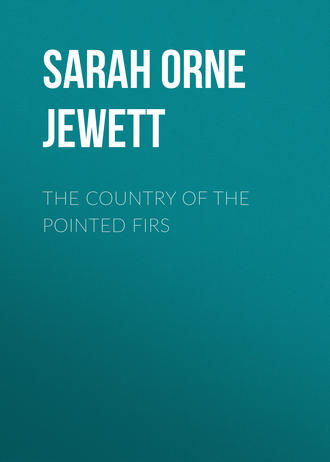 полная версия
полная версияThe Country of the Pointed Firs
“Who was the marshal?” I hastened to ask. “Was he an old soldier?”
“Don’t he do well?” answered Mrs. Todd with satisfaction.
“He don’t often have such a chance to show off his gifts,” said Mrs. Caplin, a friend from the Landing who had joined us. “That’s Sant Bowden; he always takes the lead, such days. Good for nothing else most o’ his time; trouble is, he”—
I turned with interest to hear the worst. Mrs. Caplin’s tone was both zealous and impressive.
“Stim’lates,” she explained scornfully.
“No, Santin never was in the war,” said Mrs. Todd with lofty indifference. “It was a cause of real distress to him. He kep’ enlistin’, and traveled far an’ wide about here, an’ even took the bo’t and went to Boston to volunteer; but he ain’t a sound man, an’ they wouldn’t have him. They say he knows all their tactics, an’ can tell all about the battle o’ Waterloo well’s he can Bunker Hill. I told him once the country’d lost a great general, an’ I meant it, too.”
“I expect you’re near right,” said Mrs. Caplin, a little crestfallen and apologetic.
“I be right,” insisted Mrs. Todd with much amiability. “‘Twas most too bad to cramp him down to his peaceful trade, but he’s a most excellent shoemaker at his best, an’ he always says it’s a trade that gives him time to think an’ plan his maneuvers. Over to the Port they always invite him to march Decoration Day, same as the rest, an’ he does look noble; he comes of soldier stock.”
I had been noticing with great interest the curiously French type of face which prevailed in this rustic company. I had said to myself before that Mrs. Blackett was plainly of French descent, in both her appearance and her charming gifts, but this is not surprising when one has learned how large a proportion of the early settlers on this northern coast of New England were of Huguenot blood, and that it is the Norman Englishman, not the Saxon, who goes adventuring to a new world.
“They used to say in old times,” said Mrs. Todd modestly, “that our family came of very high folks in France, and one of ‘em was a great general in some o’ the old wars. I sometimes think that Santin’s ability has come ‘way down from then. ‘Tain’t nothin’ he’s ever acquired; ‘twas born in him. I don’t know’s he ever saw a fine parade, or met with those that studied up such things. He’s figured it all out an’ got his papers so he knows how to aim a cannon right for William’s fish-house five miles out on Green Island, or up there on Burnt Island where the signal is. He had it all over to me one day, an’ I tried hard to appear interested. His life’s all in it, but he will have those poor gloomy spells come over him now an’ then, an’ then he has to drink.”
Mrs. Caplin gave a heavy sigh.
“There’s a great many such strayaway folks, just as there is plants,” continued Mrs. Todd, who was nothing if not botanical. “I know of just one sprig of laurel that grows over back here in a wild spot, an’ I never could hear of no other on this coast. I had a large bunch brought me once from Massachusetts way, so I know it. This piece grows in an open spot where you’d think ‘twould do well, but it’s sort o’ poor-lookin’. I’ve visited it time an’ again, just to notice its poor blooms. ‘Tis a real Sant Bowden, out of its own place.”
Mrs. Caplin looked bewildered and blank. “Well, all I know is, last year he worked out some kind of plan so’s to parade the county conference in platoons, and got ‘em all flustered up tryin’ to sense his ideas of a holler square,” she burst forth. “They was holler enough anyway after ridin’ ‘way down from up country into the salt air, and they’d been treated to a sermon on faith an’ works from old Fayther Harlow that never knows when to cease. ‘Twa’n’t no time for tactics then,—they wa’n’t a’thinkin’ of the church military. Sant, he couldn’t do nothin’ with ‘em. All he thinks of, when he sees a crowd, is how to march ‘em. ‘Tis all very well when he don’t ‘tempt too much. He never did act like other folks.”
“Ain’t I just been maintainin’ that he ain’t like ‘em?” urged Mrs. Todd decidedly. “Strange folks has got to have strange ways, for what I see.”
“Somebody observed once that you could pick out the likeness of ‘most every sort of a foreigner when you looked about you in our parish,” said Sister Caplin, her face brightening with sudden illumination. “I didn’t see the bearin’ of it then quite so plain. I always did think Mari’ Harris resembled a Chinee.”
“Mari’ Harris was pretty as a child, I remember,” said the pleasant voice of Mrs. Blackett, who, after receiving the affectionate greetings of nearly the whole company, came to join us,—to see, as she insisted, that we were out of mischief.
“Yes, Mari’ was one o’ them pretty little lambs that make dreadful homely old sheep,” replied Mrs. Todd with energy. “Cap’n Littlepage never’d look so disconsolate if she was any sort of a proper person to direct things. She might divert him; yes, she might divert the old gentleman, an’ let him think he had his own way, ‘stead o’ arguing everything down to the bare bone. ‘Twouldn’t hurt her to sit down an’ hear his great stories once in a while.”
“The stories are very interesting,” I ventured to say.
“Yes, you always catch yourself a-thinkin’ what if they all was true, and he had the right of it,” answered Mrs. Todd. “He’s a good sight better company, though dreamy, than such sordid creatur’s as Mari’ Harris.”
“Live and let live,” said dear old Mrs. Blackett gently. “I haven’t seen the captain for a good while, now that I ain’t so constant to meetin’,” she added wistfully. “We always have known each other.”
“Why, if it is a good pleasant day tomorrow, I’ll get William to call an’ invite the capt’in to dinner. William’ll be in early so’s to pass up the street without meetin’ anybody.”
“There, they’re callin’ out it’s time to set the tables,” said Mrs. Caplin, with great excitement.
“Here’s Cousin Sarah Jane Blackett! Well, I am pleased, certain!” exclaimed Mrs. Todd, with unaffected delight; and these kindred spirits met and parted with the promise of a good talk later on. After this there was no more time for conversation until we were seated in order at the long tables.
“I’m one that always dreads seeing some o’ the folks that I don’t like, at such a time as this,” announced Mrs. Todd privately to me after a season of reflection. We were just waiting for the feast to begin. “You wouldn’t think such a great creatur’ ‘s I be could feel all over pins an’ needles. I remember, the day I promised to Nathan, how it come over me, just’s I was feelin’ happy’s I could, that I’d got to have an own cousin o’ his for my near relation all the rest o’ my life, an’ it seemed as if die I should. Poor Nathan saw somethin’ had crossed me,—he had very nice feelings,—and when he asked what ‘twas, I told him. ‘I never could like her myself,’ said he. ‘You sha’n’t be bothered, dear,’ he says; an’ ‘twas one o’ the things that made me set a good deal by Nathan, he did not make a habit of always opposin’, like some men. ‘Yes,’ says I, ‘but think o’ Thanksgivin’ times an’ funerals; she’s our relation, an’ we’ve got to own her.’ Young folks don’t think o’ those things. There she goes now, do let’s pray her by!” said Mrs. Todd, with an alarming transition from general opinions to particular animosities. “I hate her just the same as I always did; but she’s got on a real pretty dress. I do try to remember that she’s Nathan’s cousin. Oh dear, well; she’s gone by after all, an’ ain’t seen me. I expected she’d come pleasantin’ round just to show off an’ say afterwards she was acquainted.”
This was so different from Mrs. Todd’s usual largeness of mind that I had a moment’s uneasiness; but the cloud passed quickly over her spirit, and was gone with the offender.
There never was a more generous out-of-door feast along the coast then the Bowden family set forth that day. To call it a picnic would make it seem trivial. The great tables were edged with pretty oak-leaf trimming, which the boys and girls made. We brought flowers from the fence-thickets of the great field; and out of the disorder of flowers and provisions suddenly appeared as orderly a scheme for the feast as the marshal had shaped for the procession. I began to respect the Bowdens for their inheritance of good taste and skill and a certain pleasing gift of formality. Something made them do all these things in a finer way than most country people would have done them. As I looked up and down the tables there was a good cheer, a grave soberness that shone with pleasure, a humble dignity of bearing. There were some who should have sat below the salt for lack of this good breeding; but they were not many. So, I said to myself, their ancestors may have sat in the great hall of some old French house in the Middle Ages, when battles and sieges and processions and feasts were familiar things. The ministers and Mrs. Blackett, with a few of their rank and age, were put in places of honor, and for once that I looked any other way I looked twice at Mrs. Blackett’s face, serene and mindful of privilege and responsibility, the mistress by simple fitness of this great day.
Mrs. Todd looked up at the roof of green trees, and then carefully surveyed the company. “I see ‘em better now they’re all settin’ down,” she said with satisfaction. “There’s old Mr. Gilbraith and his sister. I wish they were sittin’ with us; they’re not among folks they can parley with, an’ they look disappointed.”
As the feast went on, the spirits of my companion steadily rose. The excitement of an unexpectedly great occasion was a subtle stimulant to her disposition, and I could see that sometimes when Mrs. Todd had seemed limited and heavily domestic, she had simply grown sluggish for lack of proper surroundings. She was not so much reminiscent now as expectant, and as alert and gay as a girl. We who were her neighbors were full of gayety, which was but the reflected light from her beaming countenance. It was not the first time that I was full of wonder at the waste of human ability in this world, as a botanist wonders at the wastefulness of nature, the thousand seeds that die, the unused provision of every sort. The reserve force of society grows more and more amazing to one’s thought. More than one face among the Bowdens showed that only opportunity and stimulus were lacking,—a narrow set of circumstances had caged a fine able character and held it captive. One sees exactly the same types in a country gathering as in the most brilliant city company. You are safe to be understood if the spirit of your speech is the same for one neighbor as for the other.
XIX. The Feast’s End
THE FEAST was a noble feast, as has already been said. There was an elegant ingenuity displayed in the form of pies which delighted my heart. Once acknowledge that an American pie is far to be preferred to its humble ancestor, the English tart, and it is joyful to be reassured at a Bowden reunion that invention has not yet failed. Beside a delightful variety of material, the decorations went beyond all my former experience; dates and names were wrought in lines of pastry and frosting on the tops. There was even more elaborate reading matter on an excellent early-apple pie which we began to share and eat, precept upon precept. Mrs. Todd helped me generously to the whole word BOWDEN, and consumed REUNION herself, save an undecipherable fragment; but the most renowned essay in cookery on the tables was a model of the old Bowden house made of durable gingerbread, with all the windows and doors in the right places, and sprigs of genuine lilac set at the front. It must have been baked in sections, in one of the last of the great brick ovens, and fastened together on the morning of the day. There was a general sigh when this fell into ruin at the feast’s end, and it was shared by a great part of the assembly, not without seriousness, and as if it were a pledge and token of loyalty. I met the maker of the gingerbread house, which had called up lively remembrances of a childish story. She had the gleaming eye of an enthusiast and a look of high ideals.
“I could just as well have made it all of frosted cake,” she said, “but ‘twouldn’t have been the right shade; the old house, as you observe, was never painted, and I concluded that plain gingerbread would represent it best. It wasn’t all I expected it would be,” she said sadly, as many an artist had said before her of his work.
There were speeches by the ministers; and there proved to be a historian among the Bowdens, who gave some fine anecdotes of the family history; and then appeared a poetess, whom Mrs. Todd regarded with wistful compassion and indulgence, and when the long faded garland of verses came to an appealing end, she turned to me with words of praise.
“Sounded pretty,” said the generous listener. “Yes, I thought she did very well. We went to school together, an’ Mary Anna had a very hard time; trouble was, her mother thought she’d given birth to a genius, an’ Mary Anna’s come to believe it herself. There, I don’t know what we should have done without her; there ain’t nobody else that can write poetry between here and ‘way up towards Rockland; it adds a great deal at such a time. When she speaks o’ those that are gone, she feels it all, and so does everybody else, but she harps too much. I’d laid half of that away for next time, if I was Mary Anna. There comes mother to speak to her, an’ old Mr. Gilbreath’s sister; now she’ll be heartened right up. Mother’ll say just the right thing.”
The leave-takings were as affecting as the meetings of these old friends had been. There were enough young persons at the reunion, but it is the old who really value such opportunities; as for the young, it is the habit of every day to meet their comrades,—the time of separation has not come. To see the joy with which these elder kinsfolk and acquaintances had looked in one another’s faces, and the lingering touch of their friendly hands; to see these affectionate meetings and then the reluctant partings, gave one a new idea of the isolation in which it was possible to live in that after all thinly settled region. They did not expect to see one another again very soon; the steady, hard work on the farms, the difficulty of getting from place to place, especially in winter when boats were laid up, gave double value to any occasion which could bring a large number of families together. Even funerals in this country of the pointed firs were not without their social advantages and satisfactions. I heard the words “next summer” repeated many times, though summer was still ours and all the leaves were green.
The boats began to put out from shore, and the wagons to drive away. Mrs. Blackett took me into the old house when we came back from the grove: it was her father’s birthplace and early home, and she had spent much of her own childhood there with her grandmother. She spoke of those days as if they had but lately passed; in fact, I could imagine that the house looked almost exactly the same to her. I could see the brown rafters of the unfinished roof as I looked up the steep staircase, though the best room was as handsome with its good wainscoting and touch of ornament on the cornice as any old room of its day in a town.
Some of the guests who came from a distance were still sitting in the best room when we went in to take leave of the master and mistress of the house. We all said eagerly what a pleasant day it had been, and how swiftly the time had passed. Perhaps it is the great national anniversaries which our country has lately kept, and the soldiers’ meetings that take place everywhere, which have made reunions of every sort the fashion. This one, at least, had been very interesting. I fancied that old feuds had been overlooked, and the old saying that blood is thicker than water had again proved itself true, though from the variety of names one argued a certain adulteration of the Bowden traits and belongings. Clannishness is an instinct of the heart,—it is more than a birthright, or a custom; and lesser rights were forgotten in the claim to a common inheritance.
We were among the very last to return to our proper lives and lodgings. I came near to feeling like a true Bowden, and parted from certain new friends as if they were old friends; we were rich with the treasure of a new remembrance.
At last we were in the high wagon again; the old white horse had been well fed in the Bowden barn, and we drove away and soon began to climb the long hill toward the wooded ridge. The road was new to me, as roads always are, going back. Most of our companions had been full of anxious thoughts of home,—of the cows, or of young children likely to fall into disaster,—but we had no reasons for haste, and drove slowly along, talking and resting by the way. Mrs. Todd said once that she really hoped her front door had been shut on account of the dust blowing in, but added that nothing made any weight on her mind except not to forget to turn a few late mullein leaves that were drying on a newspaper in the little loft. Mrs. Blackett and I gave our word of honor that we would remind her of this heavy responsibility. The way seemed short, we had so much to talk about. We climbed hills where we could see the great bay and the islands, and then went down into shady valleys where the air began to feel like evening, cool and camp with a fragrance of wet ferns. Mrs. Todd alighted once or twice, refusing all assistance in securing some boughs of a rare shrub which she valued for its bark, though she proved incommunicative as to her reasons. We passed the house where we had been so kindly entertained with doughnuts earlier in the day, and found it closed and deserted, which was a disappointment.
“They must have stopped to tea somewheres and thought they’d finish up the day,” said Mrs. Todd. “Those that enjoyed it best’ll want to get right home so’s to think it over.”
“I didn’t see the woman there after all, did you?” asked Mrs. Blackett as the horse stopped to drink at the trough.
“Oh yes, I spoke with her,” answered Mrs. Todd, with but scant interest or approval. “She ain’t a member o’ our family.”
“I thought you said she resembled Cousin Pa’lina Bowden about the forehead,” suggested Mrs. Blackett.
“Well, she don’t,” answered Mrs. Todd impatiently. “I ain’t one that’s ord’narily mistaken about family likenesses, and she didn’t seem to meet with friends, so I went square up to her. ‘I expect you’re a Bowden by your looks,’ says I. ‘Yes, I can take it you’re one o’ the Bowdens.’ ‘Lor’, no,’ says she. ‘Dennett was my maiden name, but I married a Bowden for my first husband. I thought I’d come an’ just see what was a-goin’ on!”
Mrs. Blackett laughed heartily. “I’m goin’ to remember to tell William o’ that,” she said. “There, Almiry, the only thing that’s troubled me all this day is to think how William would have enjoyed it. I do so wish William had been there.”
“I sort of wish he had, myself,” said Mrs. Todd frankly.
“There wa’n’t many old folks there, somehow,” said Mrs. Blackett, with a touch of sadness in her voice. “There ain’t so many to come as there used to be, I’m aware, but I expected to see more.”
“I thought they turned out pretty well, when you come to think of it; why, everybody was sayin’ so an’ feelin’ gratified,” answered Mrs. Todd hastily with pleasing unconsciousness; then I saw the quick color flash into her cheek, and presently she made some excuse to turn and steal an anxious look at her mother. Mrs. Blackett was smiling and thinking about her happy day, though she began to look a little tired. Neither of my companions was troubled by her burden of years. I hoped in my heart that I might be like them as I lived on into age, and then smiled to think that I too was no longer very young. So we always keep the same hearts, though our outer framework fails and shows the touch of time.
“‘Twas pretty when they sang the hymn, wasn’t it?” asked Mrs. Blackett at suppertime, with real enthusiasm. “There was such a plenty o’ men’s voices; where I sat it did sound beautiful. I had to stop and listen when they came to the last verse.”
I saw that Mrs. Todd’s broad shoulders began to shake. “There was good singers there; yes, there was excellent singers,” she agreed heartily, putting down her teacup, “but I chanced to drift alongside Mis’ Peter Bowden o’ Great Bay, an’ I couldn’t help thinkin’ if she was as far out o’ town as she was out o’ tune, she wouldn’t get back in a day.”
XX. Along Shore
ONE DAY as I went along the shore beyond the old wharves and the newer, high-stepped fabric of the steamer landing, I saw that all the boats were beached, and the slack water period of the early afternoon prevailed. Nothing was going on, not even the most leisurely of occupations, like baiting trawls or mending nets, or repairing lobster pots; the very boats seemed to be taking an afternoon nap in the sun. I could hardly discover a distant sail as I looked seaward, except a weather-beaten lobster smack, which seemed to have been taken for a plaything by the light airs that blew about the bay. It drifted and turned about so aimlessly in the wide reach off Burnt Island, that I suspected there was nobody at the wheel, or that she might have parted her rusty anchor chain while all the crew were asleep.
I watched her for a minute or two; she was the old Miranda, owned by some of the Caplins, and I knew her by an odd shaped patch of newish duck that was set into the peak of her dingy mainsail. Her vagaries offered such an exciting subject for conversation that my heart rejoiced at the sound of a hoarse voice behind me. At that moment, before I had time to answer, I saw something large and shapeless flung from the Miranda’s deck that splashed the water high against her black side, and my companion gave a satisfied chuckle. The old lobster smack’s sail caught the breeze again at this moment, and she moved off down the bay. Turning, I found old Elijah Tilley, who had come softly out of his dark fish-house, as if it were a burrow.
“Boy got kind o’ drowsy steerin’ of her; Monroe he hove him right overboard; ‘wake now fast enough,” explained Mr. Tilley, and we laughed together.
I was delighted, for my part, that the vicissitudes and dangers of the Miranda, in a rocky channel, should have given me this opportunity to make acquaintance with an old fisherman to whom I had never spoken. At first he had seemed to be one of those evasive and uncomfortable persons who are so suspicious of you that they make you almost suspicious of yourself. Mr. Elijah Tilley appeared to regard a stranger with scornful indifference. You might see him standing on the pebble beach or in a fish-house doorway, but when you came nearer he was gone. He was one of the small company of elderly, gaunt-shaped great fisherman whom I used to like to see leading up a deep-laden boat by the head, as if it were a horse, from the water’s edge to the steep slope of the pebble beach. There were four of these large old men at the Landing, who were the survivors of an earlier and more vigorous generation. There was an alliance and understanding between them, so close that it was apparently speechless. They gave much time to watching one another’s boats go out or come in; they lent a ready hand at tending one another’s lobster traps in rough weather; they helped to clean the fish or to sliver porgies for the trawls, as if they were in close partnership; and when a boat came in from deep-sea fishing they were never too far out of the way, and hastened to help carry it ashore, two by two, splashing alongside, or holding its steady head, as if it were a willful sea colt. As a matter of fact no boat could help being steady and way-wise under their instant direction and companionship. Abel’s boat and Jonathan Bowden’s boat were as distinct and experienced personalities as the men themselves, and as inexpressive. Arguments and opinions were unknown to the conversation of these ancient friends; you would as soon have expected to hear small talk in a company of elephants as to hear old Mr. Bowden or Elijah Tilley and their two mates waste breath upon any form of trivial gossip. They made brief statements to one another from time to time. As you came to know them you wondered more and more that they should talk at all. Speech seemed to be a light and elegant accomplishment, and their unexpected acquaintance with its arts made them of new value to the listener. You felt almost as if a landmark pine should suddenly address you in regard to the weather, or a lofty-minded old camel make a remark as you stood respectfully near him under the circus tent.






